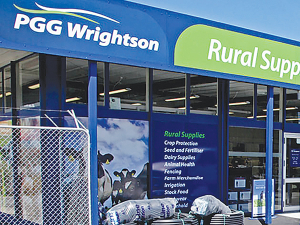Primary Exports Boom Helps Lift PGW Half-Year Earnings
Booming primary sector exports are helping lift earnings for farm service providers.
 PGG Wrightson is feeling the impact of the current rural downturn, reporting a 40% drop in net profit to $12.7 million in the six months to December 31, 2023.
PGG Wrightson is feeling the impact of the current rural downturn, reporting a 40% drop in net profit to $12.7 million in the six months to December 31, 2023.
Rural retailer PGG Wrightson (PGW) is feeling the impact of the current rural downturn, reporting a 40% drop in net profit to $12.7 million in the six months to December 31, 2023.
PGW’s operating earnings before interest, tax, depreciation, and amortisation (ebitda) fell by 24% to $36.6m and total revenue decreased nearly $25m, or 4%, to $560.9m.
Revenue from its retail and water business dropped $21.7m to $478.3m with operating ebitda down $9m to $40m. Its agency business – comprising livestock, wool, and real estate – produced an operating ebitda of $1.4m, down $2.2m, with revenue dropping $3.1m to $81.6m.
The company says both areas of the business have been impacted by decreased on-farm spending and weak commodity prices.
Net interest-bearing debt was up $1.4m to $96.9m compared to December 31, 2022.
The company also renewed and extended its bank facilities in December, with total facility limits of $185m. That’s up $25m, allowing for “future growth opportunities including GOSTOCK.”
Meanwhile, PGW’s shareholders will have to wait until the end of its financial year to see whether they’ll get a dividend.
Following its half-year result, the rural retailer suspended the interim dividend, saying it doesn’t want to add debt “in the face of rising interest rates”.
The company believes it is “prudent” to wait until the full year before reviewing the dividend payout ratio – “if any”.
Last financial year, PGW paid a full year dividend of 10 cents per share.
This half-year report noted that given the “current challenges” faced in the sector as well as the broader economy and the impact on the business, the board had determined not to pay an interim dividend.
“The board considers that this is an appropriate and prudent measure to take at the present time.”
PGW’s board is also looking at its ongoing dividend payout ratio, given the need to “strike the right balance” between sustainable distributions for shareholders while retaining sufficient earnings in the best interests of the company.
PGW also updated its full-year guidance, expecting it to be around $50m – down from the $52m it issued in October last year.
The Meat Industry Association of New Zealand (MIA) today announced that Chief Executive Officer Sirma Karapeeva has resigned from the role.
The winners of the 2026 Hawke’s Bay/Wairarapa Dairy Industry Awards were announced at the annual awards dinner held at Copthorne Solway Park in Masterton on Thursday evening.
Environment Southland is welcoming this week’s decision by the Environmental Protection Authority (EPA) to approve the release of Blaptea elguetai, a leaf‑feeding beetle that will help control the highly invasive Chilean flame creeper.
This March, the potato industry is proudly celebrating International Women’s Day on 8 March alongside the International Year of the Woman Farmer, recognising the vital role women play across every part of the sector — from paddocks and packhouses to research, leadership, and innovation.
Fruit trader Seeka posted a record profit and returns to shareholders in 2025.
Recent weather events in the Bay of Plenty, Gisborne/Tairawhiti, and Canterbury have been declared a medium-scale adverse event.

OPINION: A mate of yours truly reckons rural Manawatu families are the latest to suffer under what he calls the…
OPINION: If old Winston Peters thinks building trade relations with new nations, such as India, isn't a necessary investment in…